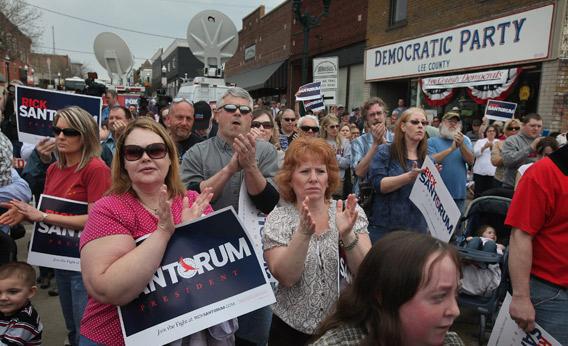On Saturday, sometime after 8 p.m. Eastern, CNN will get to make a call: Rick Santorum has won the Louisiana primary. The color on the election board will change from blank to purple, because for whatever reason that’s the color Santorum’s been assigned. Wolf Blitzer will pronounce this “very interesting” or a development that CNN is “watching closely.” If we’re lucky, he’ll do both.
It’ll be fun. It won’t actually tell us who’s getting most of Louisiana’s 46 delegates to the Republican National Convention. Only 20 delegates will be assigned tomorrow, split between whichever candidates get more than 25 percent of the vote. The leftover delegates, and 23 more besides, will sit in limbo until June 2, when Republicans will meet in Shreveport to parcel them out. Hang on, sorry. Right before that, in April, there’ll be district conventions that assign delegates for Shreveport. And none of these newly empowered Republicans have to pay attention to primary results.
This is extremely confusing, isn’t it? Now you know why Mitt Romney’s rivals, seemingly bested by the cruel God of Math, are confident that they can still take him out. In Louisiana today, set for his worst defeat in the South so far, Newt Gingrich was musing about the rule that allows anyone to be nominated if enough delegates in five states make it so. “My hope is we will find five states,” he said, “and I also think, frankly, that the Republican National Committee would be quite willing to have me put in nomination under any circumstance.” A few days earlier, Rick Santorum’s campaign gave reporters a 56-minute briefing on how they—and, to a lesser extent, Ron Paul—would mop up delegates in under-the-radar state conventions.
How many delegates are we talking about? The states that have already held primaries and voted represent, technically, 983 delegates. Eight of these states—Iowa, Maine, Colorado, Minnesota, Missouri, Washington, Alaska, and Wyoming—have not yet assigned all of their delegates. Together, they have 246 delegates waiting to be meted out at district and county conventions.
Just look at Iowa. That state’s Jan. 3 caucuses assigned no delegates. None. The real work there only started to happen on March 10, when Republicans gathered in 99 county conventions, picking their representatives for the four congressional district meet-ups on April 21. In their Tuesday conference call, the Santorum campaign’s delegate-counter John Yob predicted that he’d win the “vast majority” of Iowa’s 25 delegates. The AP count had Santorum winning only seven of them.
Is the Santorum campaign right? We have no idea. If anyone might know, it would be Ryan Gough, the Iowa Republican Party’s organization director. I called him on Friday to check what had happened in those March 10 klatches.
“I’m just now getting back lists of delegates from 99 counties,” he said. “They’re lists of names and addresses. They don’t have an R for a Romney supporter or an S for a Santorum supporter, or anything like that. The party can’t tell where the support is at this point.”
Other caucus states have started to turn in pledged delegate lists, and the results aren’t too bad for Romney. When he lost Colorado’s mid-February caucus (the nonbinding one that reporters covered), Romney won Douglas County by a rough 3-2 margin over Santorum. He won the next round—the one that actually counted—by a 5-1 margin. On March 18, in Washington, Ron Paul won delegates from Seattle-area districts that he’d lost in the first, nonbinding caucus.
The chaos may end up helping Romney. In the big Tuesday conference call, the Santorum campaign claimed that they were only 124 delegates behind Romney, not 281 delegates behind, as CNN had been saying. Those projections, according to Yob, were based “on what has transpired in the early stages of the Iowa, Washington, and Missouri contests.” They were, to some extent, guessing. Romney’s campaign knows what it’s doing in some states. Ron Paul’s base consists entirely of triathletes who can outlast anyone in a game of stand-around-till-the-caucus-ends.
Hang on, though—step back a few paces. In the long run of the primary, this chaos is a huge waste of time, and that’s only bad for the front-runner. Organizing some primary state, or even organizing in a binding caucus, can help a national campaign organize in virgin territory. Canvassers learn how to canvass. People who don’t DVR through their commercials meet the candidates in 30-second bites.
Slogging through county and district conventions gets you none of that. It bogs staff time and money down in a picayune process that won’t matter five minutes after the conventions are over. The Facebook page of Washington for Romney is not full of people organizing to take a blue state away from Barack Obama. It’s larded up with articles about how Ron Paul or Rick Santorum is trying to take delegates away from the guy who should be winning.
Should they feel so entitled? Well, Romney will probably cross the 4 million popular vote margin when Louisiana votes. He’s more than 1 million votes ahead of Santorum, close to 2 million votes ahead of Gingrich. The Santorum campaign has all but admitted that a convention win would require some delegate-math chicanery, like a challenge to break up delegates from winner-take-all states. (The campaign helpfully noted that the state getting challenged doesn’t vote on the challenge. Florida wouldn’t be able to vote on the threat to 50 Romney delegates.) If Santorum or Paul win delegates in places that voted for Romney, are they thwarting the will of the people? Honestly, they don’t care about that.
“Different states set their processes under which they elect national convention delegates, and we’re just following that process,” Yob said on Tuesday. “In some states, it so happens that the media chose to cover events that weren’t relevant toward the election of delegates. That’s just the reality of our political system.”
He kind of has a point about the media.
